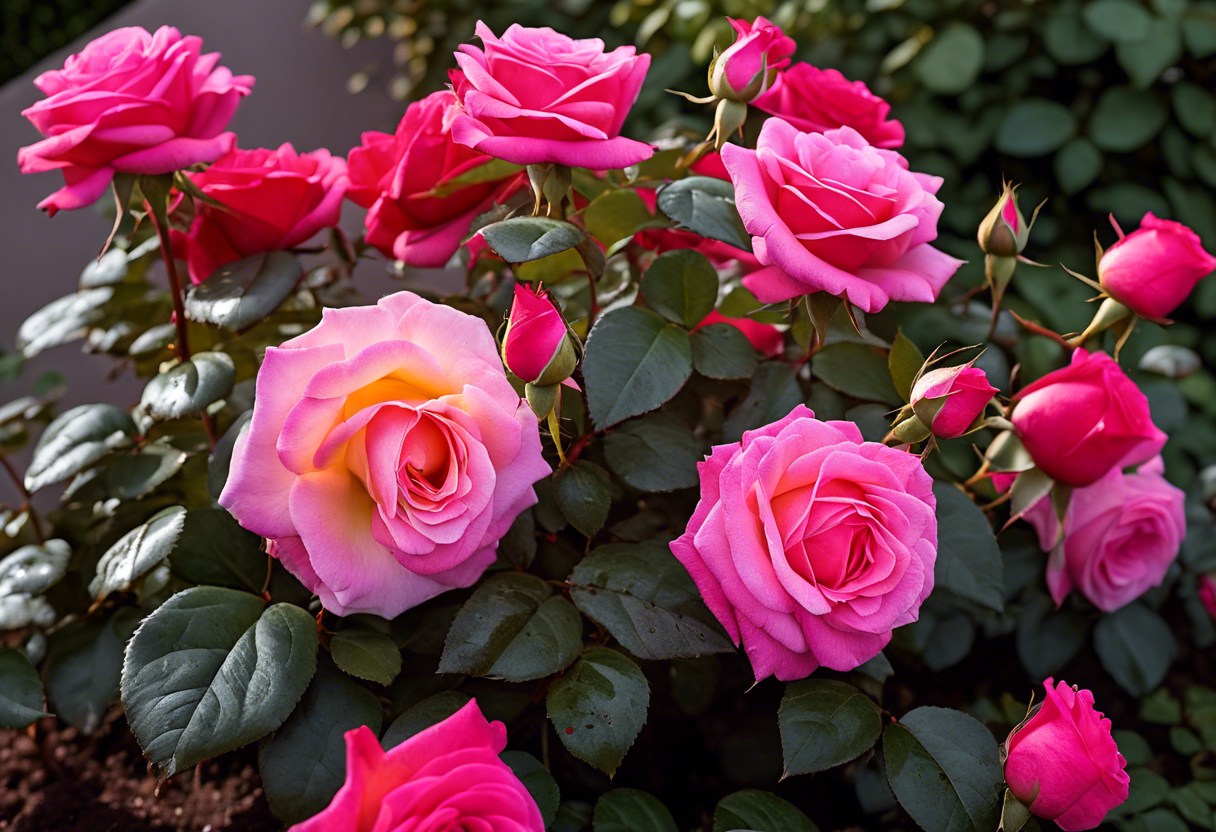Ever wondered, Do Roses Like Coffee Grounds? I did too! One lazy afternoon, sipping my coffee and admiring my rose garden, the thought just popped into my head. After all, roses do love a good meal and coffee grounds are rich in nutrients.
But before we jump to conclusions, let’s take a deeper dive. The relationship between roses and coffee grounds is not as straightforward as you might think. Keep reading about ‘Do Roses Like Coffee Grounds?’ You might be in for a surprise!
Key Takeaways
- Roses do like coffee grounds as they provide essential nutrients, particularly nitrogen.
- Coffee grounds also improve soil structure and drainage.
- However, overuse can lead to soil acidity which roses don’t prefer.
- It’s recommended to mix coffee grounds with other organic matter before application.
- Always test your soil pH before and after application to ensure it remains within the ideal range for roses (6.0 – 6.5).
Understanding Coffee Grounds
Let’s dive into the world of coffee grounds, shall we? These little brown bits have a story to tell. They’re not just the byproduct of your morning brew; they’ve got uses that extend far beyond the coffee pot.
What are Coffee Grounds?
So, what exactly are these coffee grounds we keep yapping about? Well, they’re the leftover remnants from brewing coffee. You know, those wet and gritty bits you dump out after making your cup of joe? That’s them!
They come from all over the world, depending on where your coffee beans were grown. The texture is coarse and grainy, sorta like damp sand at the beach. Their appearance? A rich dark brown color that screams “I’m full of flavor!”
Nutritional Composition of Coffee Grounds
Now let’s talk nutrition! Coffee grounds aren’t just good for a caffeine boost; they’re packed with nutrients too! They’re rich in nitrogen, which plants absolutely love. It’s like plant food on steroids!
But wait, there’s more! Coffee grounds also contain phosphorus and potassium – two essential nutrients for plant growth. So next time you brew a pot of coffee, think twice before tossing those grounds away.
In short, coffee ground compost can be a real game-changer for your garden or potted plants. So remember folks – waste not, want not! Especially when it comes to coffee grounds.
Roses and Their Nutrient Requirements
When it comes to rose nutrition, understanding the essential nutrients for roses is key. It’s like knowing what your favorite dish needs to taste just right. This knowledge is crucial for optimal rose plant care, especially when feeding roses or choosing a rose fertilizer.
Basic Nutrient Needs of Roses
Roses are pretty demanding – they’re not satisfied with just water and sunshine. They need a balanced diet of nitrogen, phosphorus, and potassium. Nitrogen for roses? Yep! It’s like protein for us humans; it promotes healthy leaf growth and vibrant green foliage.
But that’s not all! Phosphorus plays a vital role in root development and flower production. Think of it as the secret ingredient that makes your roses bloom beautifully. And let’s not forget about potassium. This nutrient helps in disease resistance and overall plant vigor.
So next time you notice any signs of rose nutrient deficiency, don’t panic! Just remember these three essential nutrients when fertilizing roses.
Importance of Soil pH for Roses
Now, let’s talk about soil pH. You might be wondering, “What does soil pH for roses have to do with anything?” Well, much like how we prefer certain foods, roses too have their preferences when it comes to soil acidity or alkalinity.
Ideal soil pH levels for growing healthy roses typically range from 6.0 to 6.5 – slightly acidic territory. Why? Because this range allows maximum nutrient availability to the plants.
But what if your soil isn’t in this sweet spot? No worries! You can adjust the soil pH by adding lime (for acidic soils) or sulfur (for alkaline soils). So whether you’re dealing with acidic soil and roses or battling the effects of alkaline soil on your precious blooms, remember: balance is key!
The Impact of Coffee Grounds on Soil
So, you’re wondering, “Do Roses Like Coffee Grounds?“. Well, let’s dive into the nitty-gritty. Coffee grounds can be a game-changer for your soil. They can alter pH levels and enrich the soil with nutrients. It’s like giving your garden a caffeine boost! This is what we call a coffee grounds soil amendment.
How Coffee Grounds Affect Soil pH
Now, let’s talk about the acidic nature of coffee grounds. When you add them to your soil, they can change its pH level. It’s like adding a dash of vinegar to your salad dressing – it changes the taste, right? In this case, it changes the acidity of your garden soil.
But wait! Is this good or bad for roses? Well, roses are pretty picky plants. They don’t like their soil too acidic or too alkaline. So if your garden soil is already on the acidic side, adding coffee ground compost might make it too sour for their liking.
Nutrients Added to Soil by Coffee Grounds
Moving on to nutrients now. Coffee grounds are rich in nitrogen, one of the most essential nutrients for plant growth. It’s like protein for plants! Adding coffee grounds to your garden soil is like serving up a nutrient-rich buffet for your roses.
But that’s not all! Coffee grounds also contain other goodies that roses love – potassium and phosphorus. These nutrients play a key role in promoting healthy rose growth and blooming beautiful flowers.
So there you have it folks! Using coffee grounds as an organic fertilizer for roses can be beneficial if done right. Just remember not to overdo it – moderation is key in organic gardening tips!
Do Roses Like Coffee Grounds?
Well, the answer to Do Roses Like Coffee Grounds isn’t as straightforward as you might think. It’s a bit like asking if roses enjoy a good cup of joe in the morning. There are potential benefits and risks involved with using coffee grounds for roses.
Benefits of Using Coffee Grounds for Roses
Coffee grounds can be a fantastic natural fertilizer for your rose bushes. They’re packed with nutrients that roses love, making them an ideal addition to your rose plant care routine.
The nutrient-rich coffee grounds provide nitrogen, which is essential for leaf growth and color. Plus, they help improve soil structure, leading to better water retention and root health.
But it’s not just about the nutrients! Using coffee grounds also promotes garden waste recycling and composting. So, you’re not only nurturing your roses but also doing your bit for Mother Earth!
Potential Risks and Downsides
However, before you start dumping your morning brew leftovers on your roses, there are some potential downsides to consider. One of these is the issue of acidity levels in soil.
Coffee grounds can alter the pH level of your soil, potentially making it too acidic for roses. This could hinder their growth or even damage them over time.
Another risk is pest attraction. While some critters are deterred by coffee grounds, others might see it as an invitation to feast on your precious blooms.
Lastly, improper composting could lead to over-fertilization risks. Too much of a good thing can harm your plants instead of helping them grow. So remember folks – moderation is key when it comes to using coffee grounds in your garden!
Practical Tips for Using Coffee Grounds in Rose Gardening
When it comes to rose gardening tips, one of the most intriguing questions is “Do Roses Like Coffee Grounds?”. The answer is a resounding yes! Let’s dive into the practical ways of using coffee grounds in your rose garden.
When and How to Apply Coffee Grounds
The best time to apply coffee grounds for roses is during their active growth period. This usually falls in spring and early summer. You see, roses are like us humans, they need a good breakfast to kickstart their day!
Applying coffee grounds isn’t rocket science. Simply spread them around the base of your rose bushes. But remember, moderation is key here. Too much caffeine can keep anyone up at night, even roses!
It’s also important to note that coffee grounds alone won’t do the trick. They’re more like a supplement to your regular organic rose care routine rather than a standalone solution.
Combining Coffee Grounds with Other Organic Matter
Now let’s talk about mixing business with pleasure, or in this case, coffee grounds and compost. Combining these two can create an organic powerhouse for your roses.
Coffee grounds add nitrogen while compost provides a balanced diet of nutrients. It’s like serving your roses a well-rounded meal! Plus, using kitchen waste in gardening means you’re reducing waste and saving money – talk about killing two birds with one stone!
So there you have it folks! Next time you brew a pot of coffee, don’t toss those grounds away. Your roses might just be craving a caffeine fix! Remember though, balance is key when composting with coffee grounds. Happy gardening!
To Wrap Up
So, just like a toddler loves their juice box, roses indeed have a thing for coffee grounds. They’re like the secret sauce in grandma’s recipe, making roses more vibrant and healthy.
To learn more about this interesting relationship between roses and coffee grounds, check out Do Roses Like Coffee Grounds. Go ahead, give your roses a caffeine boost!





